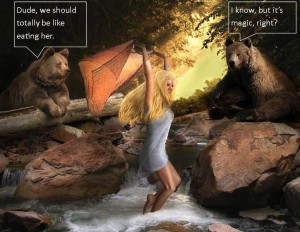 Fantasy writers and readers have a reputation for being just slightly soft in the head. I mean, what adult believes in magic? But wait a moment. All forms of writing ask for a suspension of disbelief by the reader, and there are elements of “magic” in most genres. That’s the joy of reading. By creating an imaginary world for us, the writer pushes us towards a sense of wonder. But it is easy for an author to overuse the readers’ belief in the more wonderful story elements. Since they are…well…magical, authors may think they don’t have to follow the usual rules. But use of magic has rules of its own, because that is where the writer is in the most danger of pushing readers into disbelief. The following are a few principles of writing “magic” of all sorts that authors might wish to consider. Continue reading “Are You Overusing “Magic” in Your Writing?”
Fantasy writers and readers have a reputation for being just slightly soft in the head. I mean, what adult believes in magic? But wait a moment. All forms of writing ask for a suspension of disbelief by the reader, and there are elements of “magic” in most genres. That’s the joy of reading. By creating an imaginary world for us, the writer pushes us towards a sense of wonder. But it is easy for an author to overuse the readers’ belief in the more wonderful story elements. Since they are…well…magical, authors may think they don’t have to follow the usual rules. But use of magic has rules of its own, because that is where the writer is in the most danger of pushing readers into disbelief. The following are a few principles of writing “magic” of all sorts that authors might wish to consider. Continue reading “Are You Overusing “Magic” in Your Writing?”
Tag: suspension of disbelief
Make Me Believe the Unbelievable
 Guest post
Guest post
by Walt Morton
There is a pact between every author and every reader. The pact goes like this: “I, the author, will tell you a story with characters and events so interesting and true you’ll enjoy every word to the very end.” But sometimes, good intentions fail and the story stinks. The betrayed reader throws the book into the trash and swears never to read the %&$*$ writer again.
The worst offense is when the pact between writer and reader fractures because the writer presents something false, unbelievable, or inconsistent with real life experience. Among Hollywood screenwriters, the relevant tenet is called “suspension of disbelief.” The concept originated with the poet Coleridge in 1817 who said if writers put “human interest and a semblance of truth” into stories then readers would not be put off by any implausibility of the narrative. But what are the three big violations of plausibility that most frequently send books into the trash? Continue reading “Make Me Believe the Unbelievable”
